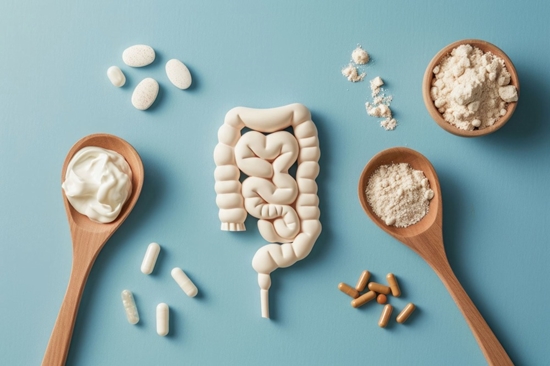یک کارآزمایی بالینی تصادفی
اثرات مکمل های پروبیوتیک اضافه شده به برنامه کاهش وزن بر معیارهای تن سنجی، ترکیب بدن، رفتار غذا خوردن و سطوح هورمون مرتبط در بیماران مبتلا به اعتیاد به غذا و بازیابی وزن پس از جراحی چاقی
افزایش وزن پس از جراحی چاقی متابولیک یک مشکل رایج است. همچنین اعتیاد به غذا یک اختلال در غذا خوردن است که می تواند یکی از دلایل افزایش وزن در این بیماران باشد. این مطالعه با هدف بررسی تأثیر مکملهای پروبیوتیک با برنامه کاهش وزن و درمان شناختی رفتاری (CBT) بر اقدامات تنسنجی، رفتار غذا خوردن، اعتیاد به غذا و سطوح هورمونی مرتبط در بیماران مبتلا به اعتیاد به غذا و افزایش وزن پس از جراحی چاقی متابولیک انجام شد.

این مقاله به بررسی این موضوع میپردازد که چگونه افزودن پروبیوتیکها (باکتریهای مفید) به برنامه کاهش وزن میتواند بر عوامل مختلف سلامتی در افرادی که پس از جراحی چاقی (جراحی که به کاهش وزن کمک میکند) دوباره وزن پیدا کردهاند و با اعتیاد به غذا دست و پنجه نرم میکنند، تأثیر بگذارد.
این مطالعه به عنوان یک کارآزمایی بالینی تصادفی، سهسوکور، کنترلشده با دارونما بر روی بیماران مبتلا به اعتیاد به غذا و افزایش وزن پس از جراحی چاقی متابولیک انجام شد. برای انجام این مطالعه شرکت کنندگان (50 نفر) یک برنامه کاهش وزن و درمان شناختی رفتاری به همراه پروبیوتیک یا دارونما را به مدت 12 هفته دریافت کردند. سپس اندازهگیریهای آنتروپومتریک، نشانگرهای بیوشیمیایی، رفتار غذا خوردن و اعتیاد به غذا مورد ارزیابی قرار گرفت.
نتایج این مطالعه نشان داد افزودن مکمل های پروبیوتیک به برنامه کاهش وزن و درمان شناختی رفتاری نسبت به این برنامه بدون مصرف پروبیوتیک در بهبود کاهش وزن، رفتار غذایی و اعتیاد به غذا در بیماران مبتلا به اعتیاد به غذا و بازیابی وزن پس از جراحی چاقی متابولیک برتری دارد.
Effects of Probiotic Supplementation Added to a Weight Loss Program on Anthropometric Measures, Body Composition, Eating Behavior, and Related Hormone Levels in Patients with Food Addiction and Weight Regain After Bariatric Surgery: A Randomized Clinical Trial
Abstract
Purpose: Weight regain after metabolic bariatric surgery is a common problem. Food addiction is an eating disorder that can be one of the reasons for weight regain in these patients. This study aimed to evaluate the effects of probiotic supplementation with a weight loss program and cognitive behavioral therapy (CBT) on anthropometric measures, eating behavior, food addiction, and related hormone levels, in patients with food addiction and weight regain after metabolic bariatric surgery.
Materials and methods: This randomized, triple-blind, placebo-controlled clinical trial was conducted on patients with food addiction and weight regain after metabolic bariatric surgery. Participants (n = 50) received a weight loss program and CBT plus probiotic, or placebo for 12 weeks. Then, anthropometric measurements, biochemical markers, eating behavior, and food addiction were assessed.
Results: Weight and body mass index (BMI) decreased significantly in the probiotic group compared to placebo (p = 0.008, p = 0.001, respectively). Fat mass was significantly decreased in the probiotic group (p < 0.001). Moreover, a significant improvement was observed in the probiotic group's eating behavior and food addiction compared to the placebo group (p < 0.001). Serum levels of leptin decreased significantly (p = 0.02), and oxytocin serum levels increased significantly (p = 0.008) in the probiotic group compared to the placebo group.
Conclusion: Adding probiotic supplements to the weight loss program and CBT is superior to the weight loss program and CBT alone in improving weight loss, eating behavior, and food addiction in patients with food addiction and weight regain after metabolic bariatric surgery.
Keywords: Food addiction; Leptin; Metabolic bariatric surgery; Oxytocin; Probiotic; Serotonin; Weight regain.
© 2024. The Author(s), under exclusive licence to Springer Science+Business Media, LLC, part of Springer Natu


.png)
.png)
ارسال نظر